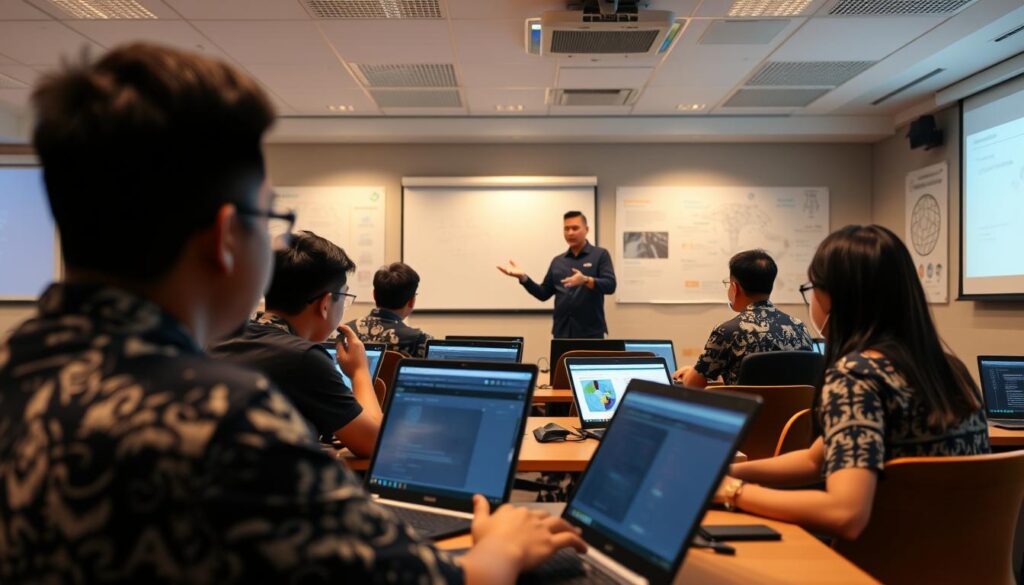How can small and medium enterprises (SMEs) use artificial intelligence (AI) to their advantage? This is a big question in today’s digital world. We explore how Philippine SMEs are using AI, showing how it can make businesses more efficient and adaptable.
AI is becoming key for businesses to stay ahead. It helps them make better decisions and work smarter. This study shows how smart use of resources can lead to growth and innovation in SMEs.
Key Takeaways
- Over 40% of SMEs have adopted AI solutions to enhance their operations.
- Implementing AI can lead to productivity gains, as noted by 72% of executives.
- AI can automate up to 80% of customer service tasks, improving response times.
- AI integration can save up to 30% on customer service costs, showcasing effective budgeting & resource allocation.
- Many marketing teams utilize AI tools to refine their content strategies and engagement efforts.
- Creating an AI-savvy workforce through targeted training can significantly boost operational efficiency.
- For detailed insights into AI implementation, please refer to this comprehensive resource.
Introduction to AI in Small and Medium Enterprises
AI is changing how small and medium enterprises (SMEs) work and plan. It’s key for boosting innovation, better customer service, and streamlining processes. Companies in retail, healthcare, and logistics use AI for smarter analytics and automated services.
This leads to big gains in efficiency and results. In Southeast Asia, SMEs are quickly adopting digital changes. They’re updating old ways to meet new market needs.
By using AI, they get better at what they do and encourage new ideas. This move is more than just new tech. It’s a big change in how they reach out to customers and meet their needs, leading to better results.
The Importance of Budgeting & Resource Allocation
For small and medium enterprises (SMEs), budget planning and resource allocation are key to AI success. They help focus spending on the most promising areas. This is crucial for growth and innovation.
Understanding the significance of budget planning
Budget planning lets SMEs know what AI investments are needed. It covers costs like technology, upkeep, and training. A solid financial plan helps manage AI expenses and grow sustainably.
Impact of resource allocation on AI success in SMEs
Bad resource allocation can hurt AI success. Mismanaged budgets waste money and miss chances. Good resource planning aligns AI with business goals, boosting performance. It also drives innovation and strengthens market position.
| Budget Component | Description | Impact on AI Success |
|---|---|---|
| Technology Investments | Costs associated with acquiring AI tools and software | Directly influences the capabilities and outputs of AI systems |
| Training | Expenses related to upskilling employees on AI technologies | Enhances team competency, leading to better utilization of AI resources |
| Maintenance | Ongoing costs for AI system upkeep | Prevents disruptions, ensuring smooth operations and sustained performance |
AI Adoption Trends in Southeast Asian SMEs
Businesses in Southeast Asia are moving fast in the digital world. AI is now a key focus. Small and medium enterprises see AI as a way to work better and serve customers better.
Recent surveys on AI implementation
Surveys show more SMEs in the region are interested in AI. They are buying AI tech, just like big companies worldwide. This move has made them more productive and competitive.
Case examples from Filipino SMEs
Filipino businesses show how AI can help. Nakie, for example, uses AI for managing its products. This has made their supply chain better and their business more flexible.
| SME Name | AI Implementation | Benefits Achieved |
|---|---|---|
| Nakie | Inventory Management Automation | Improved Efficiency, Reduced Waste |
| Enterprising Tech | Customer Relationship Management AI | Enhanced Customer Engagement, Feedback Analysis |
| FoodieDeliver | Delivery Logistics Optimization | Faster Deliveries, Higher Customer Satisfaction |
These stories show AI’s power in driving innovation in the Philippines. As more businesses use AI, they will see the good results others have had.
Strategies for Effective Resource Allocation in AI Projects
For SMEs, using AI well is key to growing and being more productive. By using smart methods, companies can find the best places to use AI. This leads to big changes and makes sure money spent on AI is worth it.
Identifying key processes for AI integration
First, SMEs need to pick which parts of their business can use AI best. They should look closely at their current ways of working. This includes:
- Customer service: Making AI help with simple questions can save time.
- Supply chain management: Better forecasting and tracking can cut costs.
- Marketing strategies: AI can help make ads more personal and effective.
By choosing the right way to use resources, businesses can work better and use AI to its fullest.
Establishing metrics for success
Once they know where to use AI, it’s important to set clear goals. These goals should include:
- Return on investment (ROI): Seeing how much money is made compared to what was spent.
- Customer satisfaction scores: Checking if people are happier with the service.
- Operational efficiency: Seeing if work gets done faster and better with AI.
Having these success metrics helps companies see if AI is working. It lets them make changes fast if needed. This way, they can keep growing and getting better with technology.

Challenges Faced by SMEs in Implementing AI Solutions
Small and medium enterprises (SMEs) face many hurdles when trying to use AI. It’s important to know these challenges to succeed in the long run.
Financial constraints and budget limitations
SMEs struggle with money issues that stop them from using advanced AI. They can’t afford the tools and training needed. It’s hard to set aside money for AI when they need it for everyday business.
This makes it tough to use AI well.
Skill gaps in AI competency among SMEs
Many SMEs don’t have the right skills for AI. Employees might not know how to use AI tools. This problem affects how well projects are done and limits new ideas.
Case Study Examples of Successful AI Resource Allocation
Looking at real-life examples gives us great insights into how AI can help with resource allocation. Nakie and CMY Cubes are two great examples. They show how AI can really help small businesses.
Nakie’s journey in AI-driven inventory management
Nakie used AI to make their inventory management better. They used AI algorithms to guess demand more accurately. This made their operations smoother and made customers happier.
By using AI, Nakie could quickly adapt to market changes. This made their business more efficient and saved money.
CMY Cubes’ marketing automation success story
CMY Cubes also used AI in their marketing. They set up a marketing automation system. This helped them create content faster and make better decisions.
Thanks to AI, CMY Cubes could focus less on manual tasks. This helped them connect better with their audience.

The Role of AI in Enhancing Efficiency and Innovation
AI is changing the game for small and medium enterprises. It makes operations more efficient and sparks new ideas. AI takes over routine tasks, freeing up staff to focus on important work.
This change cuts down on costs and boosts productivity. It lets businesses use their resources better and work smarter.
How AI impacts operational efficiency
AI makes businesses run smoother. It helps companies make fast decisions with real-time data. This leads to faster and more effective work.
AI looks at lots of data to find ways to improve. It helps businesses work better and faster.
Innovative marketing strategies powered by AI
AI gives small businesses a big advantage in marketing. It helps create personalized ads that speak to customers. This way, businesses can connect better with their audience.
By understanding what customers want, businesses can make ads that really hit the mark. This approach builds loyalty and makes marketing dollars go further.
Training and Developing an AI-Savvy Workforce
Small and medium enterprises need to focus on training their workforce in AI. This is key to unlocking AI’s full potential. It helps in boosting innovation and making operations more efficient.
Investing in employee skills ensures they can use AI tools well. It also helps them adapt to new challenges.
Importance of skills training and upskilling
As AI keeps getting better, training and upskilling are crucial. Employees must keep learning to stay up-to-date. This keeps them relevant in their jobs.
Creating a culture of learning helps workers use AI advancements. It boosts productivity and lets them contribute to the company’s goals.
Leveraging external resources for AI education
Working with schools and using external AI resources can improve training. It gives teams access to top-notch training. This is thanks to specialized courses and workshops.
Partnering with experts and learning platforms is also beneficial. It lets businesses stay updated with AI trends. They can then apply these insights to their work.

Aligning AI Initiatives with Business Goals
For small and medium enterprises, making sure AI efforts match business goals is key. This ensures that investments lead to real benefits. By setting clear AI goals, businesses can use technology wisely. This helps in improving customer happiness, making operations smoother, and cutting costs.
Identifying strategic objectives for AI use
The first step is to pinpoint specific goals that fit the business’s needs. It’s important to think about what success looks like for the company. By setting these goals, SMEs can use AI to grow and innovate.
Aligning AI outcomes with overall business success
After setting goals, the next step is to make sure AI results match the company’s big goals. For example, AI can make customer interactions better and operations more efficient. A study shows how AI can bring big returns and better customer service. Being flexible and adjusting based on business metrics helps in ongoing improvement.
Future Outlook for AI in SMEs
The world of AI in small and medium enterprises is changing fast. More businesses see the value of digital transformation and are adopting AI. Small businesses can really benefit by using these new technologies.
Emerging trends in AI for small businesses
AI is becoming more common in small businesses around the world. AI-powered customer service is a big trend. It helps improve how customers feel and interact with companies.
These systems can answer questions, track what customers do, and guess what they might want next. Another trend is using advanced data analytics. This helps businesses understand market trends and what customers like.
Benefits of ongoing AI investments
Investing in AI brings many benefits to SMEs. This money helps make operations more efficient. It lets staff do more important work by automating simple tasks.
AI also helps businesses stay competitive. It’s key to surviving in today’s digital world. Long-term, it leads to stronger customer relationships and the ability to quickly adjust to market changes.

| Investment Type | Potential Benefits | Impact on Growth |
|---|---|---|
| AI Customer Service Solutions | Improved customer engagement | Higher retention rates |
| AI Analytics Tools | Enhanced market insights | Better strategic decisions |
| Automation Software | Increased operational efficiency | Cost reduction |
| Machine Learning Models | Predictive capabilities | Proactive business strategies |
Conclusion
Effective resource allocation for AI is key for SMEs to stay competitive. It ensures they get the most out of their tech investments. Southeast Asian SMEs have shown how strategic planning can lead to big benefits.
Adopting AI is now essential for SMEs to keep up in the digital world. By setting clear goals and aligning AI projects with business needs, SMEs can grow. This approach leads to significant growth and success.
Optimizing AI resource allocation is about more than just using new tech. It’s about creating a business culture that’s agile and forward-thinking. This not only solves today’s problems but also prepares SMEs for tomorrow’s challenges.

